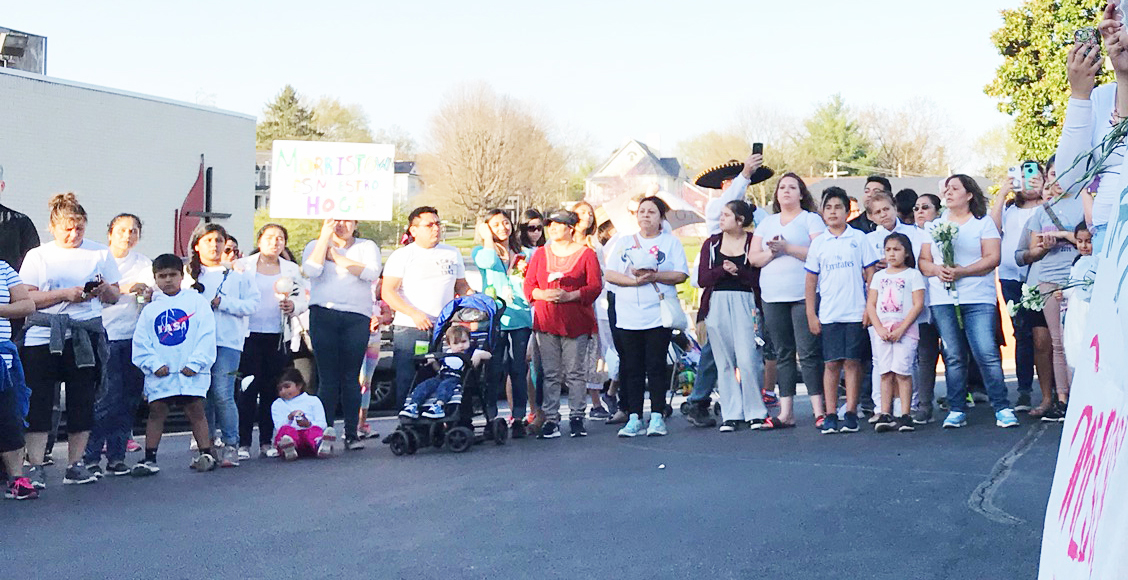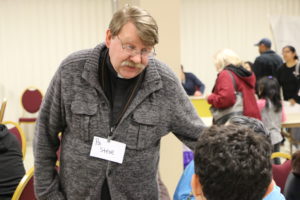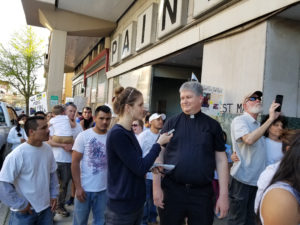Priests, parishioners respond to immigrants in need after raid separates families
Story and photography by Jim Wogan
The ongoing and complicated issue of Latin American immigration in the United States hit the Diocese of Knoxville on April 5 when federal agents raided a slaughterhouse in Grainger County and arrested nearly 100 undocumented workers there, many of them parishioners at four Catholic churches in the diocese.
Agents from U.S. Homeland Security, Immigration and Customs Enforcement, the Internal Revenue Service, and the Tennessee Highway Patrol worked in a coordinated effort to target Southeastern Provision, a meat-processing company located in Bean Station.
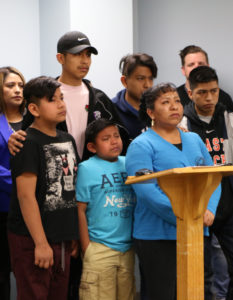
Elisabeth Morales, whose husband was among those arrested by immigration authorities in Grainger County on April 5, is joined by family members and area pastors at a press conference at St. Patrick Church in Morristown on April 7.
While the company remains in business, the families of employees detained by federal authorities are dealing with the emotional and financial fallout from what one immigration advocacy group is calling the largest U.S. workplace raid by immigration authorities in over a decade.
The arrests of 97 parishioners led Bishop Richard F. Stika to issue a statement repeating his call for common-sense action by lawmakers in Washington to resolve issues that place “an unnecessary stress on vulnerable families that have, in many ways, become victims in a much larger story.”
Many of those detained or arrested were parishioners at St. John Paul II Catholic Mission in Rutledge and St. Patrick Church in Morristown. Families at Holy Trinity Church in Jefferson City and Good Shepherd Church in Newport also were impacted.
“We know that one-half of my congregation has been affected at John Paul II,” said Glenmary Father Steve Pawelk, the pastor of St. John Paul II and St. Teresa of Kolkata Parish in Maynardville.
Veronica Galvan, the director of religious education at St. Patrick Church, estimates that half of those arrested came from her parish.
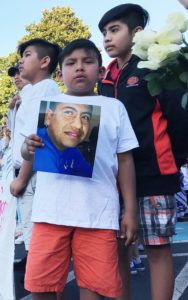 The Tennessee Immigrant & Refugee Rights Coalition said that of the 97 workers arrested, 54 were sent to detention facilities in Louisiana and Alabama and face possible deportation. Thirty-two were released and await further immigration action. Eleven were arrested on federal charges, according to reports.
The Tennessee Immigrant & Refugee Rights Coalition said that of the 97 workers arrested, 54 were sent to detention facilities in Louisiana and Alabama and face possible deportation. Thirty-two were released and await further immigration action. Eleven were arrested on federal charges, according to reports.
Pope Francis was made aware of the Morristown raid when Father Joe Reed, associate pastor at the Cathedral of the Most Sacred Heart of Jesus, presented a prayer intention to the Holy Father during a visit to the Vatican in mid-April. In a handwritten note to Pope Francis, Father Reed simply asked for prayers for the families of detainees when he was introduced to the Holy Father on April 10 as part of a convocation of Missionaries of Mercy the pope assembled.
In the immediate hours after the April 5 raid, detainees were questioned and processed by federal authorities at the National Guard Armory in Morristown. Family members and friends waited across the street until a nearby school was turned into a temporary shelter. That night, St. Patrick Church opened its parish center to families who needed assistance.
“Helping people in need is part of what I like to call the DNA of being a Catholic, a Christian,” said Father Patrick Brownell, pastor of St. Patrick Church. “I think this is what we are hard-wired for, and it is a natural thing. We don’t even think twice about it.”
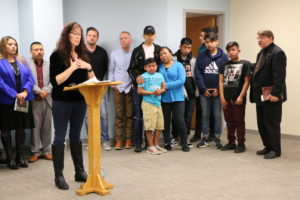
Colleen Jacobs, youth minister at St. Patrick Church in Morristown, speaks at a press conference with faith leaders and families on April 7. Glenmary Father Steve Pawelk (right) also spoke.
St. Patrick became a focal point for the families and the community. Ms. Galvan estimates at least 60 volunteers assisted with the receiving of various supplies, cooking meals, and providing care. Morristown-area businesses and members of other area churches delivered food and also provided services.
The parish parking lot in Morristown became a staging area for a constant caravan of vehicles that arrived with food, water, diapers, and other personal-care items.
“These are leadership people in our community,” Father Brownell said. “And some of them were here just to take out the trash.”
Catholic Charities of East Tennessee was on site to offer assistance. A staff member compared the impact of the arrests on families to that of people dealing with a natural disaster.
“Yesterday was shocking. Today, the reality has sunk in, and people know that their loved ones are being taken away to detention centers in Louisiana and Alabama,” said Alessandra Ceccarelli, program manager for Catholic Charities’ Office of Immigrant Services.
“Sometimes families think that these things are going to develop very quickly, but immigration courts don’t work that fast. So it is important to understand how these families are going to survive while their loved ones are detained so far away,” she added.
Alma Vazquez, a case manager for Catholic Charities in Johnson City, said East Tennessee may be unique when it comes to undocumented workers who live in the region.
“One thing that we have found in common in the Morristown area is that most people have been living here for 15-20 years. I had someone who had been living here for 28 years,” Ms. Vazquez said. “I know that people are going to say, well why have they not applied [for a path to citizenship]? It’s because most of those people did not have a way to apply.”
Debate about how to deal with undocumented workers in the United States is often soaked with emotion. The strong feelings that exist extend deep into the soil of a conflicted U.S. culture struggling to find a balance between compassion and a high regard for the rule of law.
The pastors understand that.
“The issue surrounding the raid and the deportations can be very politically charged, and I know, even in our own parish, there are people who have very different opinions as to the need for these roundups or the need to deport. I am trying to stay out of the whole political question as to whether this [offering help] is right or wrong,” Father Brownell said.
“I see people who are extremely frightened. I see kids who are upset. I see spouses who are upset. The Church has always been, and should always be, a point where people can gravitate to for some kind of sense of security and safety. It is a place where they already worship. It is a place where they pray. They know us, they trust us, and so it makes sense for them to come here, even if it’s just to get information and something to eat, or that somebody is watching their kids,” he added.
On the Sunday after the raid, at a Mass in Spanish attended by about 700 people, including Anglos and ministers and parishioners from other Christian churches in the area, Father Brownell reflected on the decision to open the parish center.
“I had no idea where this was going to go. But I had a feeling that the Church needed to get involved. So I called the bishop. He was very supportive. I told Veronica [Galvin], ‘Open the doors.’ And look what happened.”
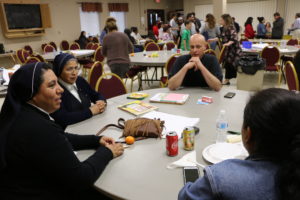
Father Patrick Brownell, with Sister Lina Ramos, MAG, and Sister Ema Soto, MAG, offer counsel at St. Patrick Church to those impacted by the April 5 ICE raid in Grainger County.
In Rutledge, Father Pawelk has been the pastor at St. John Paul II Catholic Mission since it was established by the Glenmary Home Missioners in 2011. Many of the Hispanic members of St. John Paul II work in the fields and farms around Grainger County. Others worked at the slaughterhouse, which, despite its now-questionable reputation, offered the benefit of year-round employment, as opposed to the seasonal jobs in area agriculture, according to the Glenmary priest.
“One of the consequences people don’t talk about with the undocumented situation is that in many ways it is a type of indentured servitude,” Father Pawelk said.
“The slaughterhouse has been known locally as a difficult place to work. It has demanded overtime on Sundays; it demanded overtime on the feast of Guadalupe; we worked to get the boss to cancel that,” he added.
“The Catholic Church always talks about comprehensive immigration reform. What we are talking about is secure borders, we are talking about family unification, we’re talking about a system that is broken being repaired, and we’re then talking about people coming out of the shadows and having a normal family life and normal work conditions. No one, no one, wants the current system to continue, and those of us who are pastors — we see the harm,” Father Pawelk continued.
Despite the ongoing debate over immigration reform in the United States, the April 5 raid appeared to galvanize Morristown — a community that has a relatively sizable Hispanic population. According to the most recent U.S. census (2010), almost 11 percent of the residents in Hamblen County are Hispanic or Latino. In Knox and Hamilton counties, it is less than 2 percent.
“All of a sudden it’s not abstract; it is concrete,” said Father Patrick Resen, pastor at Holy Trinity. “These aren’t just issues, they are people, and I am sure everybody has a position or a feeling about it, and there is some legitimacy on both sides of the issue. But for me it is irrelevant to what we are doing as a parish, or trying to do, or willing to do. That’s where I end it. There are people in need and you help them,” Father Resen said.
Father Alex Waraksa, a diocesan priest familiar to many East Tennessee parishes who works closely with the Hispanic community, attended a prayer vigil in Morristown on April 9 that drew an more than 800 people.
“Even with the complexities of life, we reach out and serve those who are suffering, and I thanked people in the community who had come together to serve. … It was more of the English-speaking community on that evening coming and showing support and just responding to the suffering and to put the children first because most of the children are [U.S.] citizens,” Father Waraksa said.
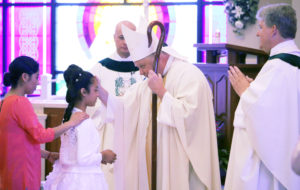
Bishop Richard F. Stika gives the sacrament of confirmation at St. Patrick Church in Morristown on April 22.
The enforcement action prompted the Diocese of Knoxville’s Office of Hispanic Ministry to mobilize its resources to aid the communities affected.
“This raid has affected not only the suffering families who were directly impacted, but all of us. The whole community suffers with them, especially because we believe that God has bestowed on every person a dignity that no one can take away,” said Blanca Primm, diocesan director of Hispanic Ministry.
On Friday, a day after the raid, just outside the parish family center on the campus of St. Patrick Church, Father Brownell was aware of what was taking place inside, but he offered no hesitation on defining his role in the weekend’s events.
“If they consider this their parish home, I am their pastor, regardless of what their status is. There is a need right now, and I am going to do what I can do. I am doing it within the parameters of what the law allows. There are probably a couple of corporal works of mercy in here somewhere,” he said with a smile.

